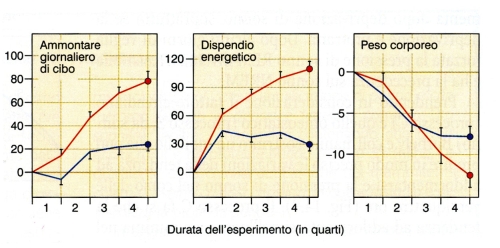The function of sleep
Although representing a period when the body’s senses and movements are cut off from its external surroundings, sleep is characterized by a continuous cerebral activity. Furthermore, the metabolism of the brain is only very slightly reduced during NREM

Fig. 1: Progress of a laboratory rat regarding food consumed, energy
expenditure and body weight over the course of one month under two
experimental conditions: a) total deprivation of sleep (red line);
b) partial deprivation of sleep (blue line).
(Credit:
G.Tononi, C.Cirelli. Sonno. Da "Fisiologia Medica". Edi.Ermes, 2005)
There are many theories on the function of sleep. Some of these concern the possibility that certain cerebral metabolic functions of a specific nature are activated during sleep to make up for physiological modifications that occur during waking hours, but experimental data has not provided us with conclusive answers so far. Other theories emphasize the role of sleep in favouring the phenomena of plasticity in nerve cells. In this regard, the data collected so far points to a determining role for sleep in modelling and stabilizing new contacts between nerve cells. These contacts would be crucial for consolidating the remembering of information acquired during waking hours. Nevertheless, despite researchers’ best efforts, the function of sleep still remains a mystery
The Webweavers: Last modified Mon, 7 Feb 2006 11:10:55 GMT